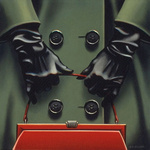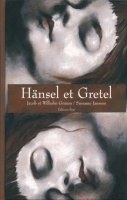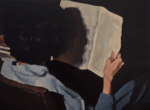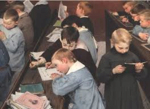 | Parfum de livres… parfum d’ailleurs
Littérature, forum littéraire : passion, imaginaire, partage et liberté. Ce forum livre l’émotion littéraire. Parlez d’écrivains, du plaisir livres, de littérature : romans, poèmes…ou d’arts…
|
|
| | Virginia Woolf |  |
|
+32darkanny animal Litany Fantaisie héroïque colimasson Steven krys shanidar Noémie Polarber IzaBzh Maline Antinea eXPie Babelle Wittgen Sosegalil bix229 Pichnette13 domreader Etoiledemer Milly swallow bulle tom léo Queenie Marie kenavo Aeriale coline Arabella Marko 36 participants | |
| Auteur | Message |
|---|
Aeriale
Léoparde domestiquée

Messages : 18120
Inscription le : 01/02/2007
 |  Sujet: Re: Virginia Woolf Sujet: Re: Virginia Woolf  Ven 5 Déc 2008 - 8:47 Ven 5 Déc 2008 - 8:47 | |
| - Nezumi a écrit:
- E.M. Forster faisait partie du Bloomsbury group (un groupe d'intellectuels et d'artistes anglais novateurs du début du 20e siècle) comme Virginia Woolf. Son style est plus classique que celui de Woolf mais il emploie à l'occasion cette technique du monologue intérieur et fait donc la part belle au cours des pensées, des sensations, à la sensualité.
Il est surtout connu en France pour les (très belles) adaptations de ses romans par James Ivory (Chambre avec vue, Retour à Howards End, Maurice).
Allez, je le relirai bientôt pour ouvrir un fil! Oh oui Nezumi, s'il te plait  Adoré ces deux premiers films (je n'ai as vu Maurice) et tu m'apprends quelque chose sur le Bloomsbury group! Je serais aussi des vôtres sur ce fil... | |
|   | | Marie
Zen littéraire

Messages : 9564
Inscription le : 26/02/2007
Localisation : Moorea
 |  Sujet: Re: Virginia Woolf Sujet: Re: Virginia Woolf  Ven 5 Déc 2008 - 19:56 Ven 5 Déc 2008 - 19:56 | |
| Sur Bloomsbury, on peut aussi lire le petit livre de souvenirs d'Angelica Garnett ( éditions Le Promeneur), Les deux coeurs de Bloomsbury. Angelica Garnett était la fille de Vanessa Stephen , soeur de Virginia, pour son père, c'est plus complexe voir ici Et puis bien sûr encore la biographie très complète de Virginia Woolf, Virginia Woolf ou l'aventure intérieure d'Hermione Lee. | |
|   | | coline
Parfum livresque

Messages : 29369
Inscription le : 01/02/2007
Localisation : Moulins- Nord Auvergne
 |  Sujet: Re: Virginia Woolf Sujet: Re: Virginia Woolf  Ven 5 Déc 2008 - 20:06 Ven 5 Déc 2008 - 20:06 | |
| - Marie a écrit:
- la biographie très complète de Virginia Woolf, Virginia Woolf ou l'aventure intérieure d'Hermione Lee.
J'ai aussi celle d'Alexandra Lemasson: Virginia Woolf.  | |
|   | | Marko
Faune frénéclectique

Messages : 17930
Inscription le : 23/08/2008
Age : 56
Localisation : Lille
 |  Sujet: Re: Virginia Woolf Sujet: Re: Virginia Woolf  Ven 5 Déc 2008 - 23:25 Ven 5 Déc 2008 - 23:25 | |
| - coline a écrit:
- Marie a écrit:
- la biographie très complète de Virginia Woolf, Virginia Woolf ou l'aventure intérieure d'Hermione Lee.
J'ai aussi celle d'Alexandra Lemasson: Virginia Woolf.
 Ce livre est bien pour une première approche mais celui d'Hermione Lee est une somme considérable et inégalée! Un travail colossal | |
|   | | domreader
Zen littéraire

Messages : 3409
Inscription le : 19/06/2007
Localisation : Ile de France
 |  Sujet: Re: Virginia Woolf Sujet: Re: Virginia Woolf  Sam 6 Déc 2008 - 18:56 Sam 6 Déc 2008 - 18:56 | |
| Merci pour toutes ces infos, dans un premier temps, je viens de trouver celle de Lemasson d'occasion. Je me promets bien de lire celle d'Hermione Lee plus tard, j'en avais d'ailleurs déjà entendu le plus grand bien. | |
|   | | Marie
Zen littéraire

Messages : 9564
Inscription le : 26/02/2007
Localisation : Moorea
 |  Sujet: Re: Virginia Woolf Sujet: Re: Virginia Woolf  Sam 6 Déc 2008 - 18:59 Sam 6 Déc 2008 - 18:59 | |
| - Citation :
- Je me promets bien de lire celle d'Hermione Lee plus tard, j'en avais d'ailleurs déjà entendu le plus grand bien.
Oui, mais je viens de regarder, 1000 pages, il faut avoir le temps... J'étais passionnée par Virginia Woolf, à l'époque! | |
|   | | coline
Parfum livresque

Messages : 29369
Inscription le : 01/02/2007
Localisation : Moulins- Nord Auvergne
 |  Sujet: Re: Virginia Woolf Sujet: Re: Virginia Woolf  Sam 6 Déc 2008 - 23:28 Sam 6 Déc 2008 - 23:28 | |
| - Marie a écrit:
-
Oui, mais je viens de regarder, 1000 pages, il faut avoir le temps...
C'est ce qui m'avait décidée pour l'autre...Je manque surtout de courage...  | |
|   | | Marko
Faune frénéclectique

Messages : 17930
Inscription le : 23/08/2008
Age : 56
Localisation : Lille
 |  Sujet: Re: Virginia Woolf Sujet: Re: Virginia Woolf  Sam 6 Déc 2008 - 23:33 Sam 6 Déc 2008 - 23:33 | |
| - coline a écrit:
- Marie a écrit:
-
Oui, mais je viens de regarder, 1000 pages, il faut avoir le temps...
C'est ce qui m'avait décidée pour l'autre...Je manque surtout de courage...  Ce genre d'ouvrage se lit en diagonale. On pioche à droite à gauche! Mais c'est passionnant | |
|   | | coline
Parfum livresque

Messages : 29369
Inscription le : 01/02/2007
Localisation : Moulins- Nord Auvergne
 |  Sujet: Re: Virginia Woolf Sujet: Re: Virginia Woolf  Sam 6 Déc 2008 - 23:34 Sam 6 Déc 2008 - 23:34 | |
| - Marko a écrit:
- coline a écrit:
- Marie a écrit:
-
Oui, mais je viens de regarder, 1000 pages, il faut avoir le temps...
C'est ce qui m'avait décidée pour l'autre...Je manque surtout de courage... 
Ce genre d'ouvrage se lit en diagonale. On pioche à droite à gauche! Mais c'est passionnant Mais j'ai horreur de lire en diagonale...Je suis une besogneuse...une appliquée...Si je lis, je lis à fond... | |
|   | | Marko
Faune frénéclectique

Messages : 17930
Inscription le : 23/08/2008
Age : 56
Localisation : Lille
 |  Sujet: Re: Virginia Woolf Sujet: Re: Virginia Woolf  Sam 6 Déc 2008 - 23:36 Sam 6 Déc 2008 - 23:36 | |
| - coline a écrit:
- Mais j'ai horreur de lire en diagonale...Je suis une besogneuse...une appliquée...Si je lis, je lis à fond...
Oui mais pas ça!! Il faut déjà tellement de temps pour lire Virginia Woolf elle-même! Bon je vais me mettre à mon résumé de La Promenade au phare... | |
|   | | coline
Parfum livresque

Messages : 29369
Inscription le : 01/02/2007
Localisation : Moulins- Nord Auvergne
 |  Sujet: Re: Virginia Woolf Sujet: Re: Virginia Woolf  Sam 6 Déc 2008 - 23:38 Sam 6 Déc 2008 - 23:38 | |
| - Marko a écrit:
- coline a écrit:
- Mais j'ai horreur de lire en diagonale...Je suis une besogneuse...une appliquée...Si je lis, je lis à fond...
Oui mais pas ça!! Il faut déjà tellement de temps pour lire Virginia Woolf elle-même! Bon je vais me mettre à mon résumé de La Promenade au phare... Oui, c'est pour ça que j'aime mieux ne pas ne pas me lancer du tout à le lire... | |
|   | | Invité
Invité
 |  Sujet: Re: Virginia Woolf Sujet: Re: Virginia Woolf  Mer 10 Déc 2008 - 15:40 Mer 10 Déc 2008 - 15:40 | |
| Un document rare, Virginia Woolf lisant un de ses essais ( Craftsmanship), sur la BBC, en 1937. A eulogy to wordsScript de l'enregistrement: - Spoiler:
Words, English words, are full of echoes, of memories, of associations—naturally. They have been out and about, on people’s lips, in their houses, in the streets, in the fields, for so many centuries. And that is one of the chief difficulties in writing them today—that they are so stored with meanings, with memories, that they have contracted so many famous marriages. The splendid word “incarnadine,” for example—who can use it without remembering also “multitudinous seas”? In the old days, of course, when English was a new language, writers could invent new words and use them. Nowadays it is easy enough to invent new words—they spring to the lips whenever we see a new sight or feel a new sensation—but we cannot use them because the language is old. You cannot use a brand new word in an old language because of the very obvious yet mysterious fact that a word is not a single and separate entity, but part of other words. It is not a word indeed until it is part of a sentence. Words belong to each other, although, of course, only a great writer knows that the word “incarnadine” belongs to “multitudinous seas.” To combine new words with old words is fatal to the constitution of the sentence. In order to use new words properly you would have to invent a new language; and that, though no doubt we shall come to it, is not at the moment our business. Our business is to see what we can do with the English language as it is. How can we combine the old words in new orders so that they survive, so that they create beauty, so that they tell the truth? That is the question.
And the person who could answer that question would deserve whatever crown of glory the world has to offer. Think what it would mean if you could teach, if you could learn, the art of writing. Why, every book, every newspaper would tell the truth, would create beauty. But there is, it would appear, some obstacle in the way, some hindrance to the teaching of words. For though at this moment at least a hundred professors are lecturing upon the literature of the past, at least a thousand critics are reviewing the literature of the present, and hundreds upon hundreds of young men and women are passing examinations in English literature with the utmost credit, still—do we write better, do we read better than we read and wrote four hundred years ago when we were unlectured, uncriticized, untaught? Is our Georgian literature a patch on the Elizabethan? Where then are we to lay the blame? Not on our professors; not on our reviewers; not on our writers; but on words. It is words that are to blame. They are the wildest, freest, most irresponsible, most unteachable of all things. Of course, you can catch them and sort them and place them in alphabetical order in dictionaries. But words do not live in dictionaries; they live in the mind. If you want proof of this, consider how often in moments of emotion when we most need words we find none. Yet there is the dictionary; there at our disposal are some half–a–million words all in alphabetical order. But can we use them? No, because words do not live in dictionaries, they live in the mind. Look again at the dictionary. There beyond a doubt lie plays more splendid than ANTONY AND CLEOPATRA; poems more lovely than the ODE TO A NIGHTINGALE; novels beside which PRIDE AND PREJUDICE or DAVID COPPERFIELD are the crude bunglings of amateurs. It is only a question of finding the right words and putting them in the right order. But we cannot do it because they do not live in dictionaries; they live in the mind. And how do they live in the mind? Variously and strangely, much as human beings live, by ranging hither and thither, by falling in love, and mating together. It is true that they are much less bound by ceremony and convention than we are. Royal words mate with commoners. English words marry French words, German words, Indian words, Negro words, if they have a fancy. Indeed, the less we enquire into the past of our dear Mother English the better it will be for that lady’s reputation. For she has gone a–roving, a–roving fair maid.
Thus to lay down any laws for such irreclaimable vagabonds is worse than useless. A few trifling rules of grammar and spelling are all the constraint we can put on them. All we can say about them, as we peer at them over the edge of that deep, dark and only fitfully illuminated cavern in which they live—the mind—all we can say about them is that they seem to like people to think and to feel before they use them, but to think and to feel not about them, but about something different. They are highly sensitive, easily made self–conscious. They do not like to have their purity or their impurity discussed. If you start a Society for Pure English, they will show their resentment by starting another for impure English—hence the unnatural violence of much modern speech; it is a protest against the puritans. They are highly democratic, too; they believe that one word is as good as another; uneducated words are as good as educated words, uncultivated words as cultivated words, there are no ranks or titles in their society. Nor do they like being lifted out on the point of a pen and examined separately. They hang together, in sentences, in paragraphs, sometimes for whole pages at a time. They hate being useful; they hate making money; they hate being lectured about in public. In short, they hate anything that stamps them with one meaning or confines them to one attitude, for it is their nature to change.
Perhaps that is their most striking peculiarity—their need of change. It is because the truth they try to catch is many–sided, and they convey it by being themselves many–sided, flashing this way, then that. Thus they mean one thing to one person, another thing to another person; they are unintelligible to one generation, plain as a pikestaff to the next. And it is because of this complexity that they survive. Perhaps then one reason why we have no great poet, novelist or critic writing to–day is that we refuse words their liberty. We pin them down to one meaning, their useful meaning, the meaning which makes us catch the train, the meaning which makes us pass the examination.
Texte intégral de Craftsmanship ici. |
|   | | Marko
Faune frénéclectique

Messages : 17930
Inscription le : 23/08/2008
Age : 56
Localisation : Lille
 |  Sujet: Re: Virginia Woolf Sujet: Re: Virginia Woolf  Mer 10 Déc 2008 - 16:39 Mer 10 Déc 2008 - 16:39 | |
| - Nezumi a écrit:
- Un document rare, Virginia Woolf lisant un de ses essais (Craftsmanship), sur la BBC, en 1937.
A eulogy to words
Merci! Je ne l'avais jamais entendue. C'est troublant | |
|   | | coline
Parfum livresque

Messages : 29369
Inscription le : 01/02/2007
Localisation : Moulins- Nord Auvergne
 |  Sujet: Re: Virginia Woolf Sujet: Re: Virginia Woolf  Mer 10 Déc 2008 - 17:38 Mer 10 Déc 2008 - 17:38 | |
| - Nezumi a écrit:
- Un document rare, Virginia Woolf lisant un de ses essais (Craftsmanship), sur la BBC, en 1937.
A eulogy to words
Script de l'enregistrement:
- Spoiler:
Words, English words, are full of echoes, of memories, of associations—naturally. They have been out and about, on people’s lips, in their houses, in the streets, in the fields, for so many centuries. And that is one of the chief difficulties in writing them today—that they are so stored with meanings, with memories, that they have contracted so many famous marriages. The splendid word “incarnadine,” for example—who can use it without remembering also “multitudinous seas”? In the old days, of course, when English was a new language, writers could invent new words and use them. Nowadays it is easy enough to invent new words—they spring to the lips whenever we see a new sight or feel a new sensation—but we cannot use them because the language is old. You cannot use a brand new word in an old language because of the very obvious yet mysterious fact that a word is not a single and separate entity, but part of other words. It is not a word indeed until it is part of a sentence. Words belong to each other, although, of course, only a great writer knows that the word “incarnadine” belongs to “multitudinous seas.” To combine new words with old words is fatal to the constitution of the sentence. In order to use new words properly you would have to invent a new language; and that, though no doubt we shall come to it, is not at the moment our business. Our business is to see what we can do with the English language as it is. How can we combine the old words in new orders so that they survive, so that they create beauty, so that they tell the truth? That is the question.
And the person who could answer that question would deserve whatever crown of glory the world has to offer. Think what it would mean if you could teach, if you could learn, the art of writing. Why, every book, every newspaper would tell the truth, would create beauty. But there is, it would appear, some obstacle in the way, some hindrance to the teaching of words. For though at this moment at least a hundred professors are lecturing upon the literature of the past, at least a thousand critics are reviewing the literature of the present, and hundreds upon hundreds of young men and women are passing examinations in English literature with the utmost credit, still—do we write better, do we read better than we read and wrote four hundred years ago when we were unlectured, uncriticized, untaught? Is our Georgian literature a patch on the Elizabethan? Where then are we to lay the blame? Not on our professors; not on our reviewers; not on our writers; but on words. It is words that are to blame. They are the wildest, freest, most irresponsible, most unteachable of all things. Of course, you can catch them and sort them and place them in alphabetical order in dictionaries. But words do not live in dictionaries; they live in the mind. If you want proof of this, consider how often in moments of emotion when we most need words we find none. Yet there is the dictionary; there at our disposal are some half–a–million words all in alphabetical order. But can we use them? No, because words do not live in dictionaries, they live in the mind. Look again at the dictionary. There beyond a doubt lie plays more splendid than ANTONY AND CLEOPATRA; poems more lovely than the ODE TO A NIGHTINGALE; novels beside which PRIDE AND PREJUDICE or DAVID COPPERFIELD are the crude bunglings of amateurs. It is only a question of finding the right words and putting them in the right order. But we cannot do it because they do not live in dictionaries; they live in the mind. And how do they live in the mind? Variously and strangely, much as human beings live, by ranging hither and thither, by falling in love, and mating together. It is true that they are much less bound by ceremony and convention than we are. Royal words mate with commoners. English words marry French words, German words, Indian words, Negro words, if they have a fancy. Indeed, the less we enquire into the past of our dear Mother English the better it will be for that lady’s reputation. For she has gone a–roving, a–roving fair maid.
Thus to lay down any laws for such irreclaimable vagabonds is worse than useless. A few trifling rules of grammar and spelling are all the constraint we can put on them. All we can say about them, as we peer at them over the edge of that deep, dark and only fitfully illuminated cavern in which they live—the mind—all we can say about them is that they seem to like people to think and to feel before they use them, but to think and to feel not about them, but about something different. They are highly sensitive, easily made self–conscious. They do not like to have their purity or their impurity discussed. If you start a Society for Pure English, they will show their resentment by starting another for impure English—hence the unnatural violence of much modern speech; it is a protest against the puritans. They are highly democratic, too; they believe that one word is as good as another; uneducated words are as good as educated words, uncultivated words as cultivated words, there are no ranks or titles in their society. Nor do they like being lifted out on the point of a pen and examined separately. They hang together, in sentences, in paragraphs, sometimes for whole pages at a time. They hate being useful; they hate making money; they hate being lectured about in public. In short, they hate anything that stamps them with one meaning or confines them to one attitude, for it is their nature to change.
Perhaps that is their most striking peculiarity—their need of change. It is because the truth they try to catch is many–sided, and they convey it by being themselves many–sided, flashing this way, then that. Thus they mean one thing to one person, another thing to another person; they are unintelligible to one generation, plain as a pikestaff to the next. And it is because of this complexity that they survive. Perhaps then one reason why we have no great poet, novelist or critic writing to–day is that we refuse words their liberty. We pin them down to one meaning, their useful meaning, the meaning which makes us catch the train, the meaning which makes us pass the examination.
Texte intégral de Craftsmanship ici. Merci Nezumi d'avoir donné le texte...sinon je n'aurais pas compris grand chose...  | |
|   | | Invité
Invité
 |  Sujet: Re: Virginia Woolf Sujet: Re: Virginia Woolf  Mer 10 Déc 2008 - 18:36 Mer 10 Déc 2008 - 18:36 | |
| - coline a écrit:
Merci Nezumi d'avoir donné le texte...sinon je n'aurais pas compris grand chose...  En fait c'était plus pour le timbre de sa voix que j'ai mis ce lien.  Si le contenu vous intéresse il provient du recueil de textes La mort de la phalène. |
|   | | Contenu sponsorisé
 |  Sujet: Re: Virginia Woolf Sujet: Re: Virginia Woolf  | |
| |
|   | | | | Virginia Woolf |  |
|
Sujets similaires |  |
|
| | Permission de ce forum: | Vous ne pouvez pas répondre aux sujets dans ce forum
| |
| |
| |
|